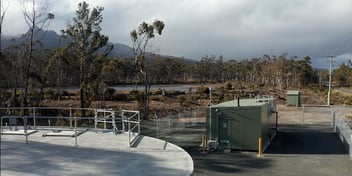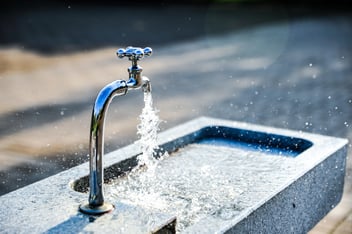Tasmanian treatment plant takes out top Australian prize for tap water
Many small Tasmanian communities have received a water treatment make-over in recent years and the results have been award-winning.
Water from the Rossarden Water Treatment Plant has taken top spot in the Water Industry Operators Association of Australia (WIOA) Ixom Best Tasting Tap Water in Australia competition.
TasWater Senior Water System Optimisation Scientist Stephen Westgate said the win is a huge result for the utility, considering that within the past decade, many Tasmanian towns were receiving restricted potable water services.
“It’s a great result for the community and is particularly pleasing because Rossarden was part of our 24glasses Regional Towns Water Supply Program which accelerated works to provide safe drinking water for 24 towns across Tasmania,” Westgate said.
“It’s a welcome bonus to see it recognised as the best tasting drinking water in Australia.”
Westgate said the 24glasses Regional Towns Water Supply Program was initiated in 2016 in recognition of the fact that Tasmania had 29 towns that were still classified under some sort of restricted service.
“We made it a commitment to the community and embarked on a really ambitious initiative to deliver potable water to all these towns within a 24-month period,” he said.
“It was about improving the community outcome, which is hugely important to us at TasWater. As a regional utility we are trying to do a huge amount for a relatively small and high dispersed customer base, compared to our mainland peers.
“Furthermore, delivering these excellent results in partnership with TRILITY shows that collaboration can be done and it can work really well. The award demonstrates that we are achieving excellent collaboration with the benefits flowing directly to our customers.”
Local challenges
TRILITY Commercial Manager Operations Tim Overland said a lot of the water being treated by the eight treatment plants we operate for TasWater is generally good quality.
“The issues are that in Tasmania the water is very cold and it has high levels of tannin, caused by the runoff from the forests in the area. Depending on the weather, there are usually also high levels of turbidity,” he said.
“So, while the water itself isn’t too bad, there needed to be a proper process put into place that would accommodate the different qualities of water at the eight different sites.”
Following an early-contract involvement process, TRILITY was selected to install treatment facilities for each of the eight sites involved in the 24glasses program.
“The Rossarden site involved doing something about the water race from Aberfoyle Creek into the dam. We also had to refurbish the raw water station, which moves the water from the dam to the water treatment plant,” Overland said.
“We also built in some storage capacity. Once the water is treated to the required standard, it needs to go into a treated water tank. It is then put into the reticulation network for the town.
“We had to keep a certain volume of water set aside for firefighting purposes. So the treated water tanks were bigger than what we’d usually install for a town the size of Rossarden, in order to ensure there is enough water left for firefighting.”
And in terms of the treatment process that results in the best tasting water in Australia, Overland said the water moves through various treatment processes to ensure optimal smell, taste and colour.
“Raw water is gravity fed to the treatment plant at the Rossarden site and there is some basic screening involved. The water then goes through a series of ultra-filtration membranes to remove all the fine particulates and most of the tannins, which changes the colour of the water,” he said.
“It then goes through granular activated carbon, which removes any residual taste and odor. From there it goes through a calcite filter, which works to re-mineralise the water.
“We have to remineralise the water because the alkalinity is very low. If we don’t get the balance right, the water causes problems in the reticulation system, including mineral leaching, which can impact the quality of the water.”
Ensuring consistency
TRILITY Operations Manager Mark Collins said managing the water quality across the eight sites can be a complicated process, with each of the sites working on different water sources of different quality.
“Part of the job is about managing a variety of water events and facilitating adjustments to the process. For example, if the turbidity becomes too high, we have enough storage space to disable the plant for a period of time to let that water event pass, and then start operating again,” he said.
In terms of maintaining such a high standard of water, Collins said a lot of work goes into system maintenance, which helps to ensure the water treatment process are working at the most optimal level.
“We go to the sites once a week to do our testing. This allows us to do regular calibrations and maintenance regimes, including cleaning analysers, cleaning the raw water screens, and doing a clean in place of the ultrafiltration membranes,” he said.
“All of this helps to ensure the systems run smoothly and that the product produced is of excellent quality. We could leave the system to run as is, but we regularly clean it to ensure we are on top of maintenance.
“Part of working in operations management to aim for the best quality drinking water for the community.”
And while the TasWater and TRILITY team has won the best-tasting tap water from the Rossarden site, Overland said the award is also a testament to how hard the maintenance teams work across the particular region.
“These eight treatment sites are in different locations, some of which are quite difficult to access. They all service small towns in remote parts of Tasmania,” he said
“This geographical aspect adds to the complexity of the work and really does make winning water quality awards a rather large feat.”


